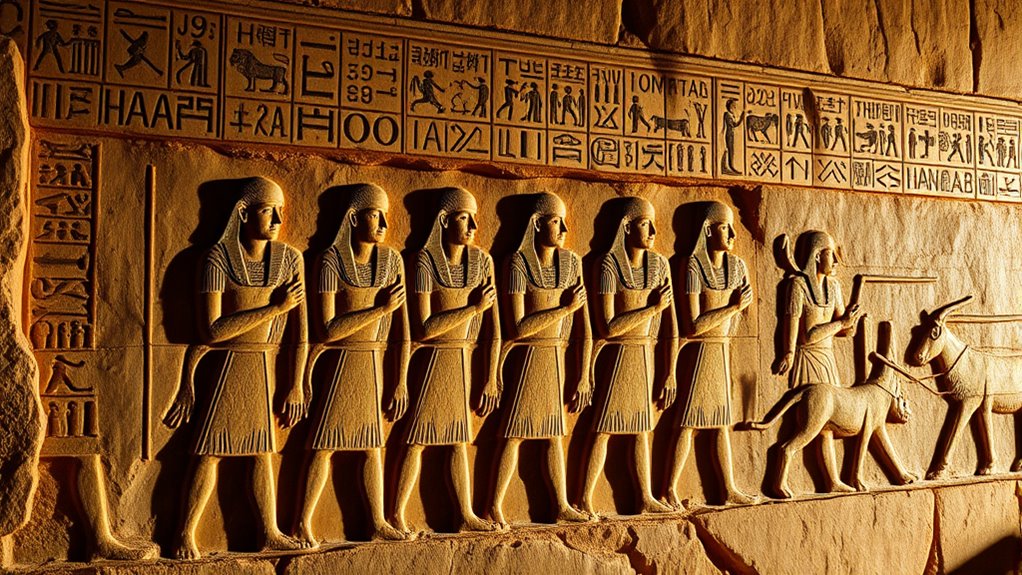The Israelites’ time in Egypt is traditionally estimated at about 430 years, based on biblical dates, but scholars suggest it may have been shorter or more complex. Archaeological evidence offers limited proof, and different interpretations of ancient texts influence these estimates. Political and cultural factors of Egypt during that period could have affected how long the Israelites stayed. To understand more about the debates and discoveries shaping this history, keep exploring the details behind these timelines.
Key Takeaways
- Biblical estimates suggest the Israelites stayed in Egypt for approximately 400 to 430 years.
- Archaeological evidence offers limited direct proof, making the exact duration uncertain.
- The timeline varies among scholars, with interpretations ranging from 210 to over 400 years.
- Cultural and political factors in Egypt may have influenced the length of Israelite presence.
- Ongoing discoveries and research continue to refine and debate the duration of the Israelite sojourn.
The Biblical Timeline of the Israelites’ Sojourn in Egypt

Have you ever wondered how long the Israelites actually stayed in Egypt according to the Bible? The biblical timeline suggests they were there for about 430 years, based on Moses’ timeline in Exodus. However, some scholars question this duration, aligning it with Egyptian hieroglyphs and records that mention shorter periods of foreign rule. These hieroglyphs provide a different perspective, hinting that the Israelites’ stay might have been less than traditionally believed. The Bible’s timeline emphasizes a long, drawn-out sojourn, but archaeological and historical evidence sometimes contradicts this. As you explore this topic, remember that interpretations vary, and the exact length remains a subject of debate among historians, theologians, and archaeologists alike.
Key Biblical Passages and Their Timeframes

To understand the duration of the Israelites’ stay in Egypt, examining key biblical passages is essential, as they provide the primary chronological framework. The Bible’s references, like Genesis 15:13-14, mention a 400-year period, but interpretations vary. Egyptian inscriptions sometimes hint at cultural symbolism, reflecting Egypt’s view of foreign populations, yet they rarely specify timelines for Israelite presence. These inscriptions highlight Egypt’s dominance and complex relations, but lack direct chronological details. The biblical passages emphasize periods of oppression and liberation, which you can align with historical estimates. By analyzing these biblical texts alongside Egyptian cultural symbolism, you gain insight into how the timeframe of Israel’s stay is understood, though precise dates remain debated due to differing interpretations.
Archaeological Evidence and Its Limitations

Archaeological evidence offers valuable insights into the presence of the Israelites in Egypt, but it also faces significant limitations. Egyptian hieroglyphs, for example, rarely mention specific groups like the Israelites, making direct identification difficult. Many inscriptions focus on pharaohs and their achievements, often omitting references to enslaved populations or foreign groups. Additionally, the names of Pharaohs linked to biblical timelines are debated, and inscriptions may have been erased or overwritten over centuries. Excavations of Egyptian sites sometimes reveal labor camps or storage facilities, but linking these directly to Israelite bondage remains speculative. Overall, while archaeological discoveries help piece together Egypt’s history, they provide limited direct evidence of the Israelites’ presence or duration in Egypt.
Historical Context of Egypt During the Proposed Periods

Understanding Egypt’s political landscape, societal structure, and economic conditions helps you see the environment the Israelites experienced. During different periods, these factors shifted considerably, shaping daily life and governance. Recognizing these changes offers valuable context for the biblical timeline.
Egypt’s Political Landscape
Have you ever wondered what Egypt’s political scene looked like during the time traditionally associated with the Israelites’ stay? During this period, Pharaoh’s policies shaped the nation’s stability and control. The Pharaoh held absolute power, often using military and administrative strategies to maintain order along the Nile River, which was essential for Egypt’s prosperity. His policies focused on harnessing the river’s resources, controlling trade, and asserting dominance over neighboring regions. The political landscape was centralized, with the Pharaoh as both a divine ruler and military leader. Power struggles occasionally arose, but the authority of the Pharaoh remained unchallenged for long periods. These political structures helped Egypt flourish, even as they set the stage for the events that would influence the Israelites’ experience in Egypt.
Societal and Economic Conditions
During the period traditionally associated with the Israelites’ stay in Egypt, society and the economy were tightly intertwined with the political stability established by the Pharaoh. Ancient agriculture formed the backbone of Egypt’s economy, relying heavily on the annual flooding of the Nile to sustain crops and guarantee food security. This agriculture supported a strict societal hierarchy, with Pharaohs and officials at the top, overseeing land and labor distribution. The majority of people, including laborers and artisans, worked within this structured system, often tied to large state projects. Economic prosperity depended on maintaining this social order, which allowed Egypt to flourish. As a result, societal stability was vital for sustaining the agricultural productivity that underpinned Egypt’s wealth during this period.
Scholars’ Estimates of the Duration of Israelite Bondage

Scholars have different ideas about how long the Israelites were enslaved in Egypt. Some rely on biblical timelines, while others look for archaeological clues to narrow down the period. Exploring both perspectives helps you understand the ongoing debate about the duration of their bondage.
Biblical Chronology Estimates
Estimating how long the Israelites were in Egypt involves examining biblical texts alongside scholarly interpretations. The Bible suggests a range from 400 to 430 years, but interpretations vary. Scholars analyze biblical timelines, considering ancient customs and agricultural practices that influenced chronologies. For example, they look at:
- The duration of the Israelites’ stay based on genealogies and biblical events
- Cultural practices that shaped record-keeping and time calculations
- The influence of lunar and solar calendars in ancient times
- The possible symbolic meanings behind numbers mentioned
These factors help refine estimates, yet uncertainties remain. Many scholars believe the biblical account aligns with a period of roughly 400 years, consistent with ancient customs and agricultural cycles that dictated historical records and societal memory.
Archaeological Evidence Insights
Archaeological findings offer crucial clues that help assess how long the Israelites may have been in Egypt. Ancient inscriptions from Egypt’s past mention periods of foreign rule and labor, providing potential timelines for Israelite presence. For example, inscriptions referencing the Pharaoh’s reign during specific dynasties can help narrow down the timeframe. Some scholars link these inscriptions to biblical events, suggesting the Israelites’ bondage coincided with certain pharaohs’ reigns. However, the evidence is often ambiguous or open to interpretation. You need to consider the context of these inscriptions and how they align with other archaeological discoveries. While they don’t give an exact duration, these clues help shape our understanding of the possible length of Israelite bondage in Egypt.
The Significance of the Name “Egypt” in Ancient Texts

Have you ever wondered why the name “Egypt” holds such deep significance in ancient texts? Its mention often symbolizes more than just a geographic location; it reflects rich ancient symbolism and cultural perceptions. Linguistic interpretations reveal that the name may derive from words meaning “black land” or “bordering the Nile,” emphasizing its historical importance. Understanding this helps you see how the ancients viewed Egypt as a land of power and mystery.
- Represents a symbol of civilization and wealth
- Embodies spiritual or divine significance
- Indicates geographic importance in texts
- Shows linguistic evolution over time
These aspects highlight how the name “Egypt” transcends literal meaning, embodying cultural and spiritual ideas rooted in ancient symbolism and linguistic shifts.
Cultural and Political Factors Influencing the Duration

The cultural and political landscape of ancient Egypt played a substantial role in shaping the length of the Israelites’ stay in the land. Egyptian hieroglyphs reveal a complex society that prioritized stability and control, which likely influenced how long foreign groups, like the Israelites, remained. Political shifts, such as changes in pharaohs or policies, could extend or shorten their presence. Canaanite influence also played a part, as interactions with neighboring cultures affected Egypt’s attitude toward outsiders. During periods of strong Canaanite ties, Egypt may have been more accommodating, prolonging the Israelites’ stay. Conversely, times of political upheaval or increased Egyptian nationalism could have led to their expulsion. These cultural and political factors intertwined, profoundly impacting the duration of the Israelites’ stay in Egypt.
Comparing Biblical Records With Extrabiblical Sources

Comparing biblical records with extrabiblical sources reveals both alignments and discrepancies that shape your understanding of the Israelites’ time in Egypt. While the Bible narrates their slavery and Exodus, other sources hint at ancient migrations and cultural exchanges that might reflect similar events. These extrabiblical texts include Egyptian records and archaeological findings, which sometimes corroborate or challenge biblical timelines. Recognize that:
Extrabiblical sources offer insights and challenges to biblical accounts of Israelite history in Egypt.
- Some inscriptions mention Semitic peoples in Egypt, aligning with biblical accounts.
- Archaeological evidence shows periods of upheaval coinciding with biblical events.
- Cultural exchanges with neighboring regions support the idea of migration and interaction.
- Discrepancies often arise in dating and details, prompting ongoing debate.
These sources help you piece together a broader picture of Israelite history within the context of ancient migrations and intercultural dynamics.
The Impact of Timeframe Interpretations on Biblical Theology

Your understanding of the Israelites’ timeframe influences how you see biblical events within their cultural and historical context. Different interpretations of the duration can shape the theological meaning behind their experience in Egypt. Recognizing this impact helps clarify how timeframes inform biblical theology and faith.
Chronology and Cultural Context
Understanding the timeframe of the Israelites’ stay in Egypt considerably shapes how you interpret biblical theology. The cultural context influences how ancient treaties and Egyptian mythology are viewed alongside biblical narratives. For example, the story of Moses can be compared to Egyptian hero myths, highlighting shared motifs. Recognizing the period helps you understand:
- How Egyptian mythology shaped beliefs and practices
- The significance of ancient treaties in establishing power dynamics
- The influence of Egyptian political structures on Israelite history
- How cultural exchanges impacted religious development
Theological Significance of Duration
How long the Israelites were in Egypt deeply influences biblical theology by shaping themes of divine promise, deliverance, and covenant. A symbolic duration suggests that the actual timeframe may serve as a metaphor for God’s faithfulness and patience. This impacts theological implications, as a shorter or longer period can alter perceptions of divine timing and fulfillment. Consider the following:
| Duration | Symbolic Meaning | Theological Implication |
|---|---|---|
| 430 years | Test of faith, perseverance | God’s promises remain true despite delays |
| Shorter period | Rapid fulfillment | Emphasizes divine power and immediacy |
| Longer period | Endurance, God’s long-suffering | Highlights patience and covenant faithfulness |
Understanding these perspectives helps you grasp how biblical timeframes extend beyond history, shaping spiritual lessons.
Current Debates and Future Discoveries Concerning the Length of Stay

Debates over the duration of the Israelites’ stay in Egypt continue to fuel scholarly discussions, especially as new archaeological discoveries and reinterpretations of ancient texts emerge. These debates often consider cultural influences and the quest for historical accuracy. Future discoveries could shed light on the timeline, challenging or confirming traditional estimates. Key points include:
- New inscriptions or artifacts may provide chronological clues.
- Reexamining ancient texts might reveal different interpretations.
- Archaeological context could clarify cultural exchanges influencing timelines.
- Integrating scientific dating methods can improve accuracy.
As research progresses, scholars remain open to revising the length of the Israelites’ stay, balancing archaeological evidence with cultural factors. These debates keep the historical narrative dynamic, prompting ongoing exploration and refinement.
Frequently Asked Questions
What Is the Estimated Total Duration of the Israelites’ Stay in Egypt?
In exploring the historical context of the Israelites’ time in Egypt, you might wonder about its duration. Archaeological evidence suggests the stay lasted around 400 years, although some scholars debate this timeline. While definitive proof remains elusive, your understanding is shaped by biblical accounts and archaeological findings. This period’s length influences interpretations of Israelite history, emphasizing the importance of ongoing research and evidence in shaping your view of their Egyptian sojourn.
How Do Different Biblical Translations Interpret the Length of Their Bondage?
You’ll notice that translation variations influence how different biblical versions interpret the length of Israelite bondage. Some translations suggest a 400-year period, while others mention “generations” or “many days,” which can imply shorter or longer durations. These differences carry theological implications, affecting how believers understand God’s promises and faithfulness. Your choice of translation shapes your perception of this biblical timeline and its significance in faith and history.
Are There Any Non-Biblical Sources That Specify the Timeline Precisely?
Think of historical corroboration like a detective’s clue—it helps piece together the past. Unfortunately, archaeological evidence doesn’t offer a precise timeline for the Israelites’ stay in Egypt. Non-biblical sources, such as Egyptian records, mention Semitic groups but lack specific dates. So, while they support some biblical stories, they don’t pin down exactly how long the Israelites were in Egypt, leaving the timeline uncertain.
How Do Cultural Practices Influence the Perceived Duration of Captivity?
You might notice that cultural memory shapes how long the Israelites perceived their captivity, often stretching or compressing the timeline based on tradition. These practices influence historical perception, making the duration seem longer or shorter in stories passed down. By emphasizing certain events, cultural practices help preserve identity and faith, even if the actual timeframe isn’t precisely known. Your understanding of this period is deeply connected to these collective memories and perceptions.
What Are the Implications of the Duration for Understanding Biblical Prophecy?
Imagine you’re viewing biblical prophecy through a smartphone screen. The duration of Israel’s captivity influences prophetic timelines and historical symbolism, helping you understand God’s plan for deliverance. A longer stay emphasizes patience and faith, highlighting divine promises. It also underscores the significance of prophetic timelines in interpreting scripture, reminding you that history often mirrors spiritual lessons. This deepens your grasp of God’s overarching plan, making biblical events resonate more profoundly in your faith journey.
Conclusion
So, after all this, you might realize that the exact length of the Israelites’ stay in Egypt remains a mystery. Despite ancient texts and modern debates, history keeps slipping through our fingers—much like the duration itself. Maybe it’s a reminder that some questions are meant to stay unanswered, encouraging you to embrace faith and curiosity over certainty. After all, sometimes the journey matters more than the precise number of years.










